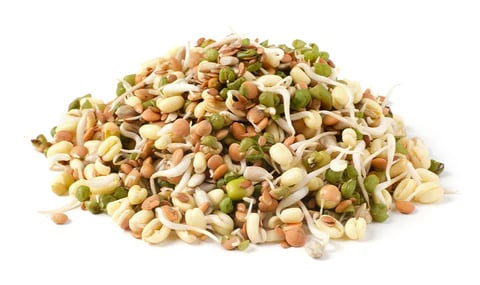Discover the Health Benefits of Sprouts for Improved Digestibility and Nutrition
Learn about the incredible health benefits of sprouts, including mung bean sprouts, and how they can enhance your diet with improved digestibility and nutrition. Incorporate sprouts for a healthier lifestyle.
Nature Cure Lab


Sprouts are a powerhouse of nutrition. They are the most nutritious of all vegetables, providing improved digestibility and nutritional qualities to the human diet since ancient times. Chinese even today retain their fame of Mung bean sprouts. Sprouts boost your immune system, improve digestion, and promote heart health. They also aid in weight loss. Therefore, incorporating sprouts into your diet can be a game changer. Ready to uncover the key to better health? Dive into the world of sprouts and unlock their incredible potential!
All grains, seeds, and legumes can be sprouted.
Grains: Bajra, Barley, Wheat, Maize and Ragi
Seeds: Alfalfa seeds, Muskmelon seeds and Fenugreek seeds
Legumes: Bengal Gram, Mung Beans, Ground nut and Peas
Alfalfa (Arabic) is the King of all the sprouts. It is a plant, and its roots grow as deep as 12 meters in the soil to bring up the valuable trace minerals of which Manganese is important to health and digestion, and it is a vital component of human Insulin. Alfalfa is also a source of vitamins A, B, C, E, and K and amino acids.
Sesame seeds are a good source of nourishment. These seeds have a higher concentration of calcium than does Milk. They are high in Lecithin, unsaturated fats, vitamin E and B complex
The benefits of sprouts
During the process of sprouting, vitamins, minerals, and protein increase significantly, while calories and carbohydrate content decrease. Analysis of dried seeds, grains, and legumes shows very low water content.
Sprouted Mung beans, for instance, have an 8.3 increase in water content over dry beans, and sodium content supports the nutritional qualities essential for digestion. Sodium contributes to the easy digestibility of sprouts.
Sprouted foods contain more nutrients than dried embryos, as demonstrated by their measured water content. During sprouting, many carbohydrate molecules break down, facilitating the absorption of atmospheric nitrogen, which is then converted into amino acids.
Sprouting beans reduces their gas-producing properties. Rich in fibre and water, sprouts can aid in alleviating constipation.
Eating sprouts is the safest and most beneficial way to enjoy the advantages of fruits and vegetables without contamination or harmful insecticides.
INSPIRE
Healing from within for a healthier, happier life.
subscribe
info@naturecurelab.com
© 2024. All rights reserved.
